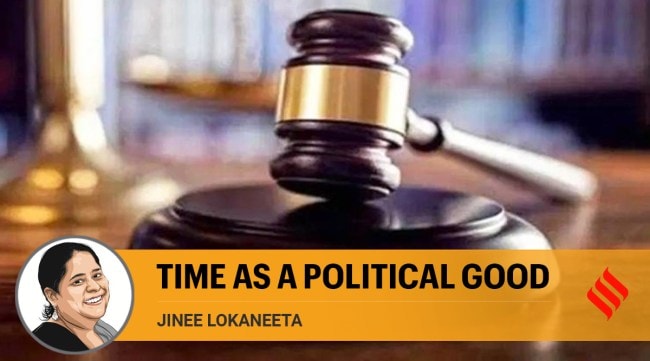Opinion Time is essential to ensuring justice in custodial death cases
Jinee Lokaneeta writes: One year after the custodial deaths of Jayaraj and Bennix in Sathankulam, we must reimagine time as a political good to ensure justice for state violence.
 Safeguards against torture require a person to be taken in front of a magistrate within a particular timeframe of 24 hours after detention.
Safeguards against torture require a person to be taken in front of a magistrate within a particular timeframe of 24 hours after detention. It’s been a year since the father-son duo, Jayaraj-Bennix, were brutally tortured and killed in police custody in Sathankulam, Tamil Nadu. Public protests, hashtags for justice and a critical discourse on police violence followed their deaths. Echoing the protests against the George Floyd and Breonna Taylor police killings in the US, their deaths led to renewed pleas for an anti-torture bill to enable India’s ratification of the UN Convention against Torture, alongside calls to revisit the glorification of police violence in Bollywood films. Critics pointed to the limits of the Supreme Court’s safeguards in the DK Basu vs State of Bengal judgment (1996) and challenged the large-scale impunity of perpetrators of violence. Unlike most other cases, the deaths of Jayaraj and Bennix did lead to charges being filed and arrests of the policemen involved and suo motu interventions of the Madras High Court. The trial is currently on. A year after their deaths, as police violence continues in everyday interactions and in custody, it may be desirable to reimagine time as a political good to ensure justice for state violence.
In her book, Political Value of Time, the political theorist Elizabeth Cohen notes that time, as a distinct value of citizenship in a liberal democracy, has often been overlooked despite the fact that it is central to how people experience democracy. A closer look at the Jayaraj and Bennix case exemplifies how procedural safeguards could not protect the father-son duo from death, and also reveals that the High Court did consider the question of time as a value in this case. However, the court stopped short of addressing the temporal injustices underlying the criminal justice system.
On June 19, 2020, the police claimed that Jayaraj and Bennix were arrested for failing to close their shop by 8 pm in violation of the Covid-related curfew. Witnesses, however, reported that the two were arrested separately and implicated in false cases. They were reportedly stripped and brutally sexually tortured with batons/lathis at the police station. Later, the CBI chargesheet said that forensic reports indicated that their bloodstains were found on the walls of the station. The father and son died in a hospital due to injuries.
Safeguards against torture require a person to be taken in front of a magistrate within a particular timeframe of 24 hours after detention. However, despite continuous bleeding from their rectums, where the batons had been inserted repeatedly, the medical examiner who examined them merely stabilised Jayaraj and Bennix, and the magistrate reportedly observed them from the balcony and sent them on remand to a jail further away from the police station. Thus, even though both the medical examination and magistrate hearing took place within the required timeframe, the safeguards were inadequate to protect them.
A closer scrutiny of the Madras High Court’s interventions also suggests a recognition of time as crucial for justice. When the court realised that the local police officers in Sathankulam were reluctant to cooperate with the judicial magistrate’s inquiry, and that there might be a delay in the CBI takeover, it immediately took steps to ensure an outside forensic expert was sent to collect the evidence from the police station, to protect the head constable Revathy as witness, while also ordering the safekeeping of the case diaries. The Madras High Court noted on June 30, 2020, “the investigation of the case is in limbo and [police] are attempting to cause disappearance of evidence…In a case of physical violence, alacrity in investigation is the need of the hour…we are constrained to step in and fill up the vacuum in order to ensure that precious evidence does not get dissipated.” Undoubtedly, these steps recognising the value of time led to some possibilities of justice.
However, these procedural safeguards merely mirror the conception of time as a universal value which is applicable to all, an impartial value that reflects modernity, stability and rationality to be continually reformed. But for time to be considered as a political good requires a recognition of the temporal injustices or a more differential treatment of people’s time, as Cohen notes. Temporal injustices are visible in the fact that only particular sections of society — Dalits, Adivasis, women, Muslims, transgender — make the bulk of the prison population in India, that many of those in prisons are undertrials whose lives remain in limbo, and that prisoners are denied the normal span of life due to inhuman conditions accentuated in a pandemic and an inability to witness the cycles of life (births and deaths and suffering) of their families. Focusing on a limited conception of time in the Jayaraj and Bennix case leads even the Madras High Court (July 2, 2020) to term the torture as the work of temporarily stressed and sick, a “few bad apples”, rather than recognising its routine nature. It is only when temporal injustices become a frame for redefining the criminal justice system that substantial justice for state violence will become structurally possible.
This column first appeared in the print edition on June 23, 2021 under the title ‘Time as political good’. The writer is a professor in political science and international relations at Drew University. She is the author of The Truth Machines: Policing, Violence and Scientific Interrogations in India (Univ of Michigan Press, Orient Blackswan, 2020)






